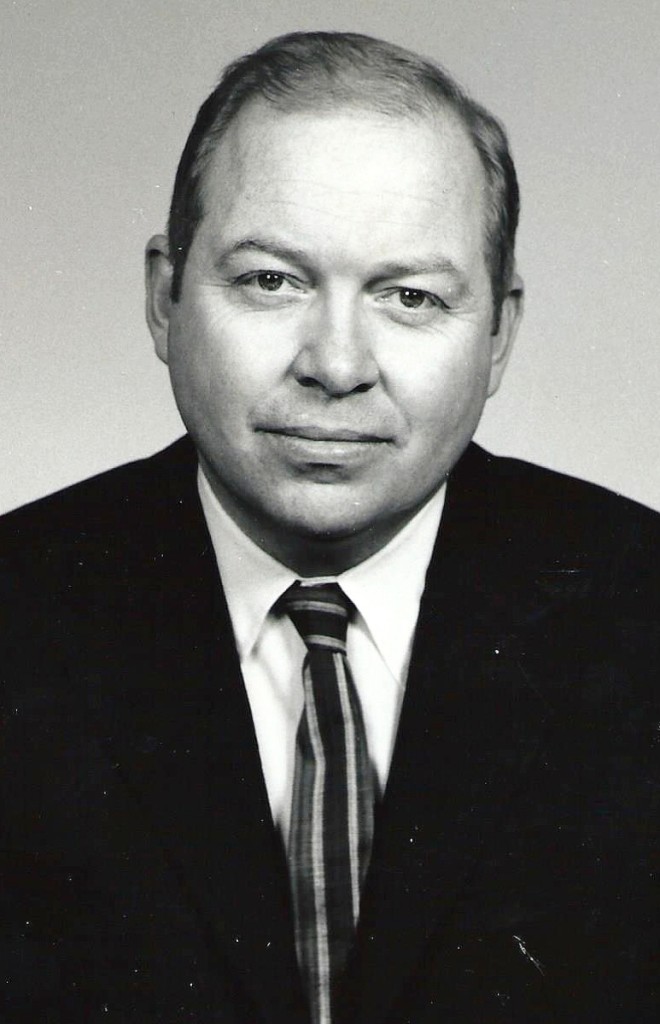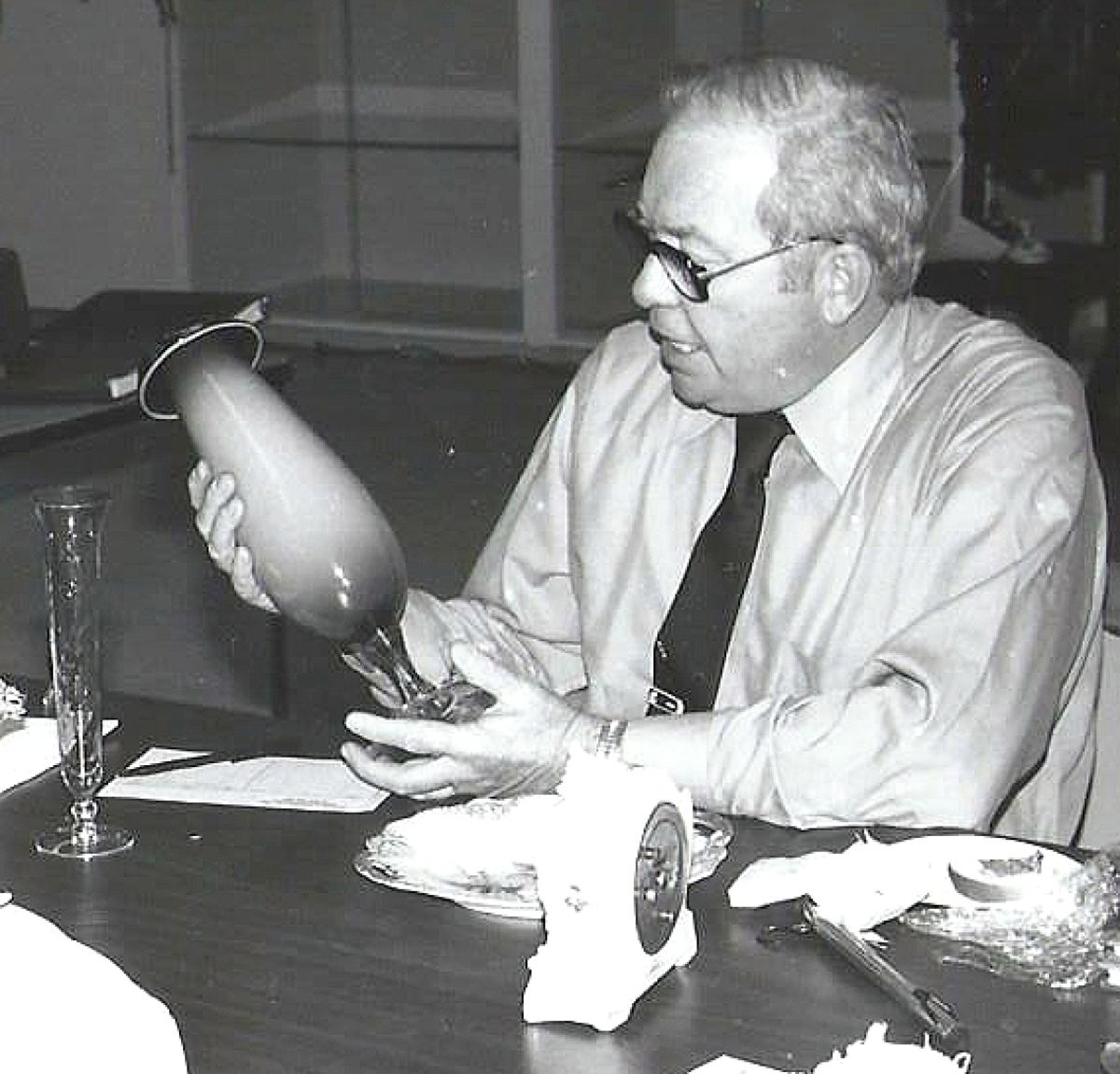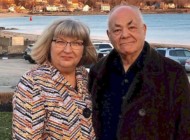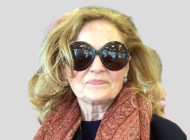SANDWICH, MASS. – Richard Aldrich Bourne, a Cape Cod auctioneer who laid a durable foundation for the contemporary auction markets for marine antiques, early American glass, wildfowl decoys and antique firearms, died December 25, 2016. He was 89.
Bourne was born in Brockton, Mass., on May 11, 1927, son of Carlton and Marion Eldredge Bourne. The family descended from Mayflower passenger Richard Bourne, an English clergyman who preached to members of the Mashpee Wampanoag tribe on Cape Cod, where the Barnstable County town of Bourne was settled in 1640.
Called Dick by friends and colleagues, Bourne attended schools in Falmouth, Mass. Soon after receiving his degree from the Manlius Military Academy in upstate New York in 1945 and ten days before VE Day, he joined the US Marine Corps and was briefly stationed in Tianjin and Peking.
Honorably discharged in 1946, he returned to Cape Cod, where he went to work for the family firm Eldredge & Bourne Moving and Storage as Allied Van Lines’ youngest driver. According to his sons Thomas C. Bourne and William E. Bourne, he logged more than 90,000 miles.
Bourne’s first introduction to antiques was while working for his mother in her antiques shop, the Red Barn, in Falmouth. In 1953, he opened the Hyannis Auction Rooms at the Eldredge & Bourne warehouse. He founded the Richard A. Bourne Company a few years later in an old cranberry barn in West Barnstable before moving to Hyannis, Mass., the company’s location for many years.
“I admired Dick Bourne for his business model. He was ahead of the curve in putting together specialty sales. He had a good reputation for handling an awful lot of nice material, which he sold with considerable knowledge,” says Skinner Inc executive vice president Stephen L. Fletcher, who still vividly recalls a small painting of fruit by Joseph Decker that Bourne spotted in a Wellfleet, Mass., restaurant.
“It was spectacular. We sold it for $57,500 in the early 1980s,” says Bill Bourne.
Early in his career, Dick Bourne developed a serious interest in marine antiques and glass, which regularly turned up in Cape Cod homes. He published a rudimentary price guide for Sandwich glass in 1959. In subsequent years, his catalogs, avidly collected today, for speciality sales served much the same purpose.
His reputation for marine antiques was secured in 1964, when he brokered the sale of the contents of the Eldredge Whaling Museum to Barbara Johnson, a collector of American folk art. “She kept what she wanted. We resold the rest. It was Bourne’s first maritime sale,” says Bill Bourne.
“His first major collection of Sandwich glass, in 1974, came from Ruth Graves Wakefield, inventor of the Toll House Cookie. The cover lot, a cobalt-blue vegetable compote, hammered at $4,300, a big price for the time,” recalls the auctioneer’s son. The market continued upward for the next decade, peaking with Bourne’s multipart sale of the William J. Elsholz Glass Collection in 1986 and 1987. Elsholz had been Dick Bourne’s customer for years.
Bill Bourne, who grew up in the business working as a sheet runner and is now a vice president at Robert C. Eldred, Inc, in East Dennis, Mass., dates his father’s start in the decoy market to 1967. “The collector Bill Mackey and Wally Furman, owner of Pleasant Bay Antiques, suggested he have a sale and helped provide a nucleus of decoys. Bourne started with one decoy sale a year. By 1983, there was enough demand for three sales a year,” he says, remembering a Cape Cod appraisal day in 1981 when a woman brought in a box containing four Joe Lincoln birds and told the auctioneer she had three more at home. The Bourne Company regularly set new benchmark prices for decoys in the years leading up to its 1978 sale of decoys from the collection of Stewart Gregory.
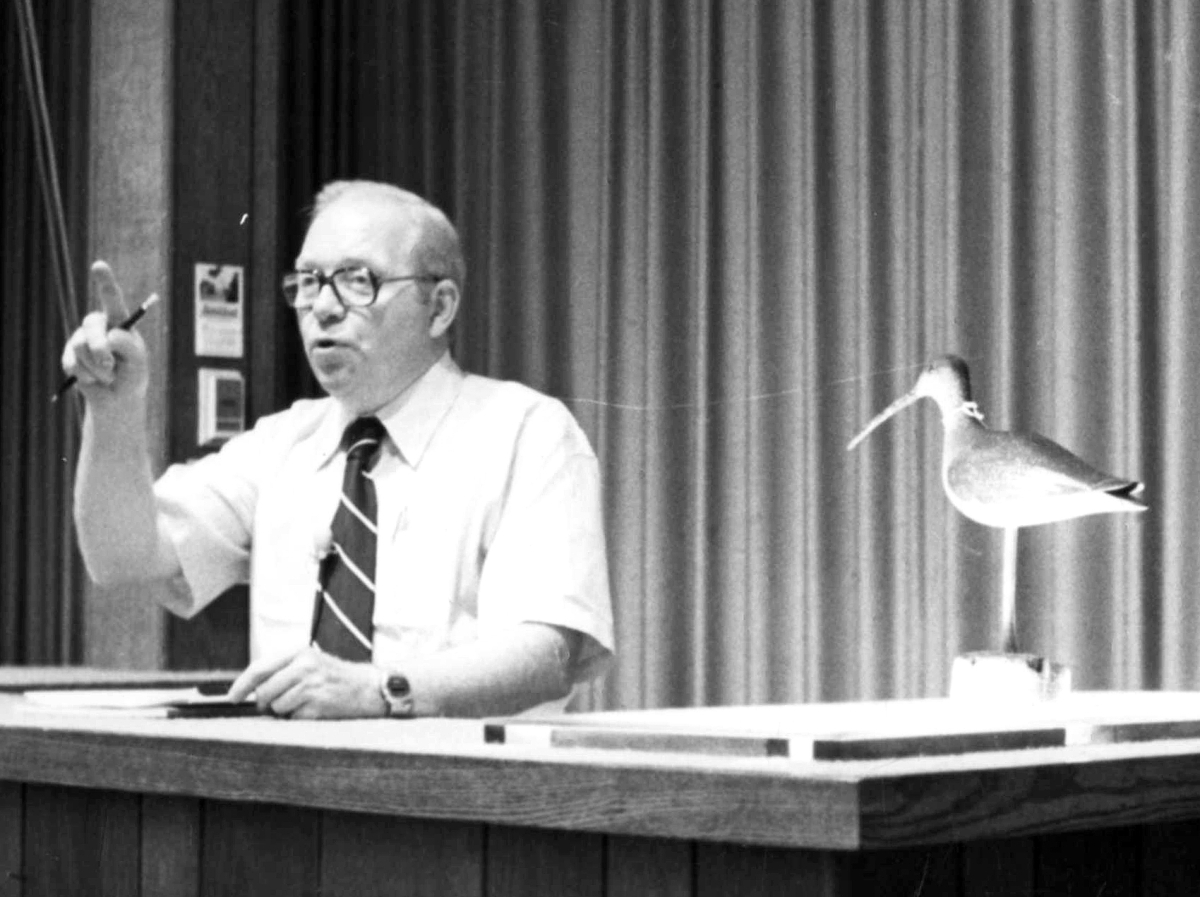
Collector Bill Mackey and dealer Wally Furman encouraged Bourne to introduce specialized decoy sales in 1967. Studded with record prices, they became thrice-annual affairs.
Richard A. Bourne also made news in the firearms category after hiring expert Eric Vaule as a consultant. In 1981, the company sold a pair of Dutch ivory-handled pistols for $125,000.
Dealers from Maine to Pennsylvania regularly made the trek to Hyannis, where the most active among them bought quantities of good American furniture and paintings. Possibly the work of Joseph Proctor, a primitive painting of a basket of fruit and flowers sold for $69,000 at Bourne in 1981. When it resurfaced at Skinner in 2013, it made $480,000.
Dick Bourne counted among his customers Andy Williams, Lee Remick, Gene Rayburn and members of the Kennedy family. He used his knowledge and contacts to aid charitable organizations, many of them on Cape Cod. He helped Mr and Mrs Josiah K. Lilly III acquire the Charles Looff carousel in Provincetown, Mass., and the Old East Windmill in Orleans, Mass., for Heritage Plantation in Sandwich, Mass. He also worked for the benefit of the Barnstable and Falmouth chapters of the Heart Fund Association, many church groups and New England Baptist Hospital.
The Richard A. Bourne Company filed for bankruptcy protection in 1993. “My father worked exceedingly hard and was very ambitious. He was an incredible marketer but not a good businessman. He had great optimism and always believed that the next big sale was just around the corner,” Bill Bourne said. After shuttering the Richard A. Bourne Company, the auctioneer moved to Florida, where between 1994 and 2002 he continued his appraisal work and assisted other auctioneers, among them Bill Hood and Sons in Delray Beach, Fla. He returned to Cape Cod following the death of his second wife, Claudia Hayes Bourne.
Dick Bourne enjoyed both the best and the worst of the business, wryly remarking to his son before his last illness, “The antiques market had a good 100-year run.”
Besides his sons and their significant others, he is survived by his first wife, Dorothy Quinn Bourne, and his grandchildren Tyler, Paige, Ethan and Kendra. Burial was private. A celebration of his life is planned for a later date. Memorial donations may be made to VNA Hospice of Cape Cod or the charity of one’s choice.
-Laura Beach

